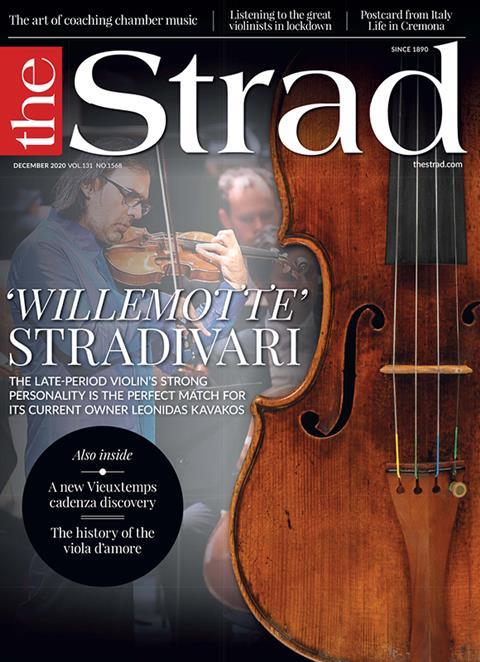William Herzog, assistant professor of violin at Northern Kentucky University, US, shares techniques to help you learn music off by heart

The following is an extract from an article in The Strad’s December 2020 ‘Willemotte’ Stradivari issue. To read in full, click here to subscribe and login. The December 2020 digital magazine and print edition are on sale now.
If you want to take memory work seriously, aim to memorise around a page of music every week. Build up gradually by practising the techniques outlined in this article for around ten minutes every morning and evening. One of the biggest obstacles to mental practice is concentration, so don’t try to do too much at once. Take breaks – the worst thing to do is to practise until you start to go wrong. It’s better to do a minute or two of mental practice, then a minute or two on your instrument, and to go back and forth, so that you check what you have done in your mind with something external, to make sure that your audiation doesn’t get too far off. Use the rest of your practice to polish, perfect the difficult passages that you have bracketed, and improve your technique. Don’t let anything stay in a memorised, unpolished state for long, or you’ll make your mistakes permanent.
Read: Technique: Memory and mental practice
Tips for teachers
It can be difficult to get students to work from memory or do any mental practice at all. To test them, ask them to alternate between playing and imagining bars of a piece from memory (Step Four) in their lessons. They won’t be able to do that if they haven’t worked at it! I also give mine weekly goals, asking them to make a map, or to memorise a set section of music for their next lesson. I don’t expect them to play perfectly to begin with, but it’s easy to see if they have engaged in the work or not. I’ll also ask to see their map, to find out if I can follow it when they play. Usually the answer is yes. For students who are shy, group singing is an encouraging, low-pressure way to work on memory. Ask them to alternate singing and imagining bars of a chorale, and to map out the music. When they realise they can do this, they’ll be motivated to do more. I hold my students’ hands through memory work to begin with, and I check on them every week. Sometimes it can dominate a lesson, but I think it’s important to invest that time. After a while it starts to feel as though they are memorising music by magic.
-
This article was published in the December 2020 ‘Willemotte’ Stradivari issue
The late-period violin’s strong personality is the perfect match for its current owner Leonidas Kavakos. Explore all the articles in this issue. Explore all the articles in this issue
More from this issue…
- The 1734 ‘Willemotte’ Stradivari violin
- A newly discovered Vieuxtemps cadenza
- Coaching chamber music for school-age students
- Amandine Beyer on recording C.P.E. Bach’s string symphonies
- The history of the viola d’amore
- Evolving interpretations of the great vioinists
Read more playing content here
-












































No comments yet